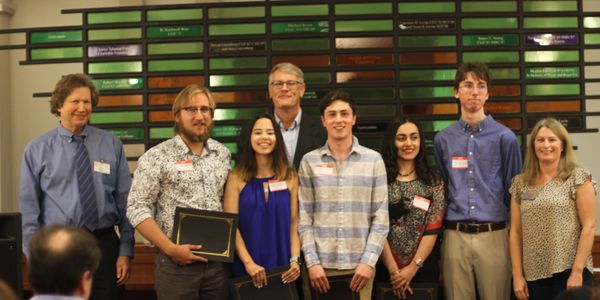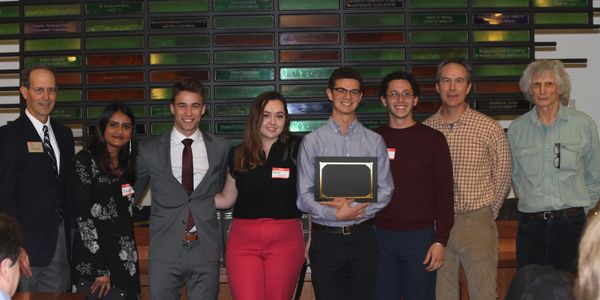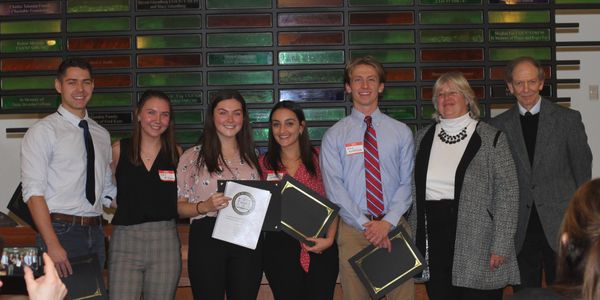2019 Capstone Award Winners
On October 18, Boston University College of General Studies celebrated the outstanding students who received awards for the Capstone projects they completed last May. The Capstone project is a 50-page research term paper that CGS students complete in their sophomore year. Students draw on two years of interdisciplinary studies, working together as a team to synthesize data into a meaningful whole. The Capstone award is given annually to the team of students who present the best overall Capstone paper and defense. It is the highest honor bestowed upon a College of General Studies student for an academic project.
Team S: The Committee for American Harm Reduction: History, Legislation, and Policy for the Future

Team S’s winning Capstone group—Carly Berry, Sydney Clark, Karsten Grape, Archie Jennings, Molly Kopp, Marina Pence, and Ryan Sacks—sought to present the Democratic Party platform with legislation to help prevent deaths from opioid overdose. The students wrote that “harm reduction means spending money on saving lives, not ruining them,” and that laws need to be “factually defensible.” The group’s recommendations included the establishment of safe injection sites in every state, and the legalization and federal funding of syringe service programs. Team S faculty wrote that the group produced a Capstone paper “that is truly a sophisticated, polished, and highly commendable piece of undergraduate research, writing and argumentation.”
Team S: Proposal for Mandating Vaccinations at the Federal Level: Combating Vaccine Hesitancy in the United States

Team S’s winning Capstone group—Chance Charley, Austin Cole, Gordon Levine, Alina O’Neil, Jack Sten, Nicole Tavana, and Nina Taylor-Dunn—prepared a thorough and convincing recommendation for mandating certain vaccinations at the federal level, in the process diving into the history of federal law regarding vaccines, the landscape of current disease outbreaks, and misconceptions surrounding vaccines. The group recommends enacting a federal law that would require a set of mandatory vaccinations for children, and also recommends increasing education about vaccines to combat misinformation. Team S faculty congratulated the members of this group for producing “a well-researched and well-written Capstone paper in which they propose a realistic recommendation based on science and philosophical principles.”
Team T: Sustainability in Boston’s Widett Circle: A Model Community

Team T’s winning Capstone group—Katie Barnett, Arden Creson, Caitlyn Federico, Greer Liguori, Gianna Loiacono, Collin McCormick, Alexis Mills, and Juliana Torrez-Ortiz—provided a plan to create a sustainable living space that would serve as a model community in South Boston. From details about sewage and underground walkways, to the types of flora that would flourish in the Boston climate, no detail was too small for this group’s attention. Team T faculty wrote, “For us, proud professors, this work represents all that an ethical and interdisciplinary education can offer when embraced by students who have chosen to cast off selfishness to seek the common good. It is a work of transcendence.”
Team U: The Moo-Vement

Team U’s winning Capstone group—Meghan Cronin, Matthew Dalton, Samuel Ducharme, Kaela Gobencion, Julie Hon, Alexis Navarro, and Yasmine Sabri—took on the beef and dairy industry, reporting on how much the industry contributes to the destruction of the environment, while also threatening human health. The group advocated for a reduction in meat consumption, an end to false advertising, and the termination of farm subsidies. Team U faculty wrote, “The solutions the Moo-vement offers may be controversial, but are certainly forward-looking. They have the potential to improve individual lives as well as help save the environment.”
Team V: A Proposal to Deter Methods of Russian Cyber Warfare

Team V’s winning Capstone group—Allison Backus, Joseph Grand, Alexander McCall, Zachary Oshins, Maeve Searles, Chandani Shah, and Samuel Shershevsky—assumed the role of a cyber defense community submitting a policy recommendation to the U.S. Department of Defense about the issue of Russian cyber-attacks on American institutions. Some of the group’s recommended measures included a return to paper ballots in future American elections and an expanded role for the National Security Agency for protection against cyber-attacks. Team V faculty praised the group’s willingness to include conflicting viewpoints about how to best address the issue. They wrote, “In the end, the group correctly allowed their own contrasting viewpoints to be reflected in their policy options, and that in turn not only strengthened their paper, but made for an unusually interesting oral defense.”
Team W: Policy Recommendation on the Issue of the Measles Outbreak in Washington State: Education, Legislation, and Social Media Countering Vaccine Hesitancy and Opposition

Team W’s winning Capstone group—Maya J. Clemons, Julianne J. Hopper, Mitsu C. Philogene, Cole W. Potter, Jennifer C. Ramirez, Elanor C. Ruscitti, and Astry P. Santana—tackled the timely topic of measles vaccination, constructing a strategy to control outbreaks and prevent future ones from occurring. They chose to focus on a region where the measles outbreak had hit particularly hard—Washington state. Team W faculty wrote, “Their solution was thoughtful, well researched and truly brought in all aspects of a successful public health solution.”
Team Y: Confronting Racial Bias in Medicine: A Proposal for the American Medical Association

Team Y’s winning Capstone group—Alyssa Carangelo, Emma Collins, Alexander Hutchinson, Katie McKenna, Michelle Nguyen, Jane Patti, and Jack Wozniak—confronted the issue of racial bias in medicine and proposed solutions to remedy the problem, from updating textbooks, to implicit bias seminars, to comparing medical outcomes to ensure equitable treatment for all patients. The group found that “Not only lay people but medical students hold false beliefs about biological differences based on race. As a result, African Americans are undertreated for pain, infant mortality is higher, and their treatment plans have poorer outcomes compared to Caucasians.” Team Y faculty wrote, “This group prepared a well-written, well-edited Capstone report. They took care to use peer-reviewed literature and research studies and to examine the historical context of the problem.”